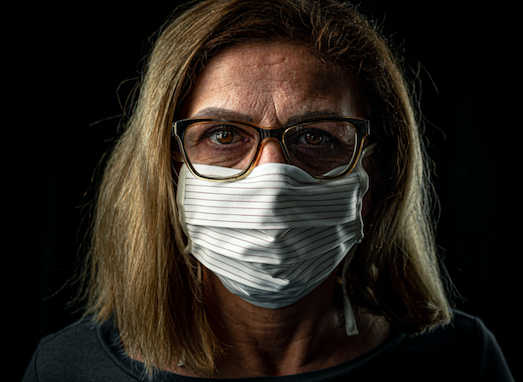Read: Elephant’s Continually-updating Coronavirus Diary. ~ Waylon
~
Have you ever seen the 1998 movie “Meet Joe Black” starring Anthony Hopkins and Brad Pitt?
If you have not, allow me to explain. If you have, allow me to refresh you.
The premise: a man is facing his own mortality, head-on, at the age of 65. He knows he will be dying soon. Death comes to take him, but it wants something in return before it does. First, it arrives as a voice within his own head. Then, within his vast library. Next, death takes the form of a human body.
Death itself. Walking around in a suit, costumed in a beautiful man with simple behaviors. Death, before taking an esteemed and brilliant man with him, wants to experience the essence of life first. Death, the one concept that so many of us fear so greatly we mentally trick ourselves into avoiding the inevitability of our own mortality, masquerading as a person we can see, touch, feel, and speak to.
What a concept. What a particularly interesting time to revisit this film, in the midst of the largest viral pandemic of our time, with an estimated 37,780 deaths as of the time of this writing.
This is the first time, in our lifetime, that any of us have experienced such a plague. And we have zero clue how to respond to it. We don’t know what to read or what to share or who to talk to or how to be. What we do know is people are dying from it. People of all ages and backgrounds, the majority elder or with preexisting health conditions making their bodies more vulnerable to an attack, but people are dying in large numbers.
There it is again. Death. The handsome young elephant in the room. The one who endearingly licks peanut butter off of a spoon.
The movie came out when I was 12 years old. I do not recall the first time I saw it. I imagine I was probably a smitten teenage girl ogling over the hot actor playing a charming man at a coffee shop whose body was taken by Death itself. I doubt I understood the depth of dialogue, the complexity of characters, the beauty of the bold speech. I can only imagine the screen writer’s pitch of this film, people laughing at the thought of pulling off Death strolling around with a multimillionaire CEO of a communication company, then falling in love with the CEO’s daughter, then taking the CEO to meet his fate at the end, grappling with his own loss of not getting to take the daughter with him. How in the world do you pull that off, make it a good ending, and not lose the audience’s understanding in the process?
The film has its share of critique, as expected. It has a 181 minute run time. Some called it slow. Some said it dragged on infinitely.
I find it to be one of the most significant examinations of a concept so scary, so uncomfortable, we don’t say or think much about the really hard feelings and memories associated with our experiences with it. The thing is, the only interactions with death that we have each had involve the loss of another, not ourselves. Because frankly, I have yet heard of a person who has died and lived to tell the tale.
So we draw on what we know of death by our observations of others’ experiences with their own deaths. What did we conclude? Did we see pain? Did we feel regret? Do we still lament over, numb away, ignore the memory? Do we have grief lingering below the surface that is much deeper than we know, like a splinter through the flesh of our toe that appears so minor to the eye but causes such immense internal distress? Do we feel alone in our losses of others, misunderstood, not understood? Maybe our loss feels forgotten. Or do we have peace, resolve, a sense of completeness, and fond memories of a life well-lived?
I am going to go out on a limb and say that, in general, we don’t cope with death well. And I’m not sure why. Are we ill-prepared? Are we scared of the actual process of dying? Is it fear of the unknown, the when, the where, the how? Are we worried we didn’t accomplish enough, leave enough, do enough? Or is it the saying of goodbyes? The finality of last conversations, the endings. What is it for you?
Bill Parrish, the CEO in the movie, the man facing his own mortality, is a courageous hero to me for a number of reasons. After learning of his imminent fate, he allows it to process, and then he accepts it. He accepts it. He understands that his time on this earth has come to a close, and he walks with Death every step of the way. He shows anger and he shows a little bit of fear, but he is bold in his assertion that he has lived a good and whole life. He has communicated to the people he loves how much he loves them and they feel safe to tell him back how they feel. He maintained integrity and honor in his business practices. And most importantly, he loved somebody else with his whole being and strived never to hurt the objects of his affection.
He did it well. And I believe the reason he was so ready to go in the end is because just that. He did it right, and he felt it deeply.
Personally, during this COVID-19 pandemic, I have found it nerve-wracking and very, very scary. I realize I don’t know who I am in uncertain times and part of me wants to curl up like a turtle in a shell, but I don’t have a shell. This is a really crushing time for the world and a frightening time to learn more about ourselves. But we have to keep working on getting it right.
Now is the time, for all of us, to focus on how we behave toward one another and ourselves.
If a conversation with someone we love feels wrong, examine our own behaviors first.
If we are unhappy, examine our own behaviors first.
If we are stressed about money, examine our own behaviors first.
If we are bored or unchallenged, examine our own behaviors first.
If we are scared or nervous, examine our own behaviors first.
If our kids are driving us nuts, examine our own behaviors first.
If our spouse is not living up to our expectations, examine our own behaviors first.
We are integrated in the gravity of our time, together. We will always share this. We will all remember this. How we behaved, how we responded.
I don’t want to regret who or what I became in it. And I know you don’t, either.
I pray we don’t ignore the pain as that stifles the divine. We need the divine.
We need to let God in, through one another (while maintaining social distance recommendations). Scoop one another some (figurative) peanut butter. Educate one another, gently, and remember to extend grace amongst our flaws.
Keep striving to get it right. Love to all.
~
Relephant:
~


 Share on bsky
Share on bsky





Read 2 comments and reply